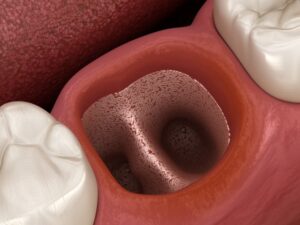
A tooth extraction can be necessary for many reasons. from severe decay to impacted wisdom teeth. While most extractions heal without complications, one condition you want to avoid is dry socket. This painful problem occurs when the blood clot that normally forms in the socket after extraction becomes dislodged or dissolves too soon, exposing the underlying bone and nerves. The result is intense discomfort and delayed healing. Fortunately, you can take steps to reduce your risk.
What Causes Dry Socket?
A healthy blood clot acts like a protective bandage inside the empty tooth socket, shielding bone and nerve tissue while the area heals. If that clot is lost — through suction, pressure, or irritation — bacteria, food debris, and air can reach the sensitive tissue, leading to inflammation and severe pain. Dry socket is most common within the first few days after an extraction.
Tips to Prevent Dry Socket
Follow Your Dentist’s Aftercare Instructions
Your dentist or oral surgeon will give you specific recovery guidelines. These often include how to clean your mouth, what to eat, and which activities to avoid. Following these directions closely is the best way to protect the blood clot.
Avoid Straws and Sucking Motions
Using a straw, smoking, or even forcefully spitting creates suction that can pull the clot out of place. Skip straws entirely for at least a week and gently let liquids and saliva exit your mouth without force.
Don’t Smoke or Use Tobacco
Nicotine not only delays healing but also increases your risk of dry socket. Smoking involves strong suction and heat, both of which can disturb the clot. Ideally, stop smoking before your surgery and continue avoiding it until you’re fully healed.
Eat Soft Foods
In the first few days, stick to soft, cool, or lukewarm foods like yogurt, applesauce, mashed potatoes, and smoothies (without a straw). Avoid crunchy, sticky, or spicy foods that might irritate the socket or leave particles behind. Gradually reintroduce firmer foods as advised by your dentist.
Keep the Area Clean (Gently)
You’ll usually be told to avoid rinsing your mouth for the first 24 hours. After that, you can use a warm saltwater rinse several times a day to keep the area clean. Swish gently to avoid disturbing the clot.
Manage Physical Activity
Intense exercise or heavy lifting can increase blood pressure and disrupt the clot. Rest for the first couple of days and slowly ease back into your normal routine.
When to Call Your Dentist
Some soreness is normal after an extraction, but if pain worsens after two or three days, radiates to your ear, or is accompanied by a foul taste or bad breath, contact your dentist immediately. These can be signs of dry socket and may require professional treatment to promote healing and relieve pain.
Dry socket is preventable in most cases with careful aftercare. By following your dentist’s instructions, avoiding risky habits like smoking or using straws, and sticking to gentle hygiene practices, you can protect your healing site and get back to feeling like yourself sooner.
About the Practice
If you’re in need of a tooth extraction, Denton Dental Care can handle the procedure with the compassion and care that we’re known for. We’re not interested in treating patients like just another number in a file or rushing them out the door to get the next warm body in. Whenever you visit us, you’ll be provided with the one-on-one attention you deserve. Don’t wait another minute – head to our website to schedule your appointment or call us at (940) 383-3300.
